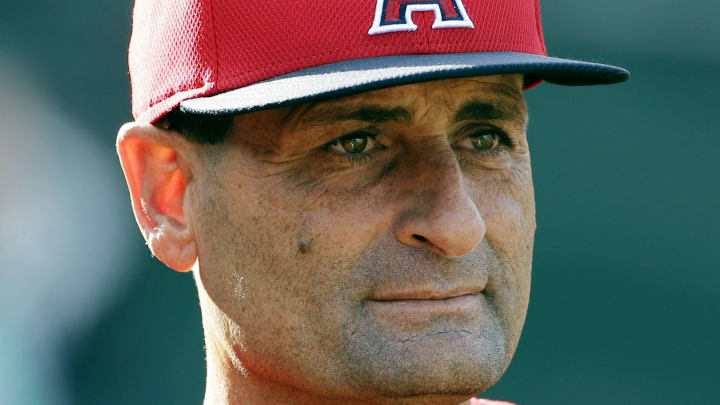Angels coach Ebel gets players' attention with a whistle

OAKLAND, Calif. (AP) In a piercing staccato, Dino Ebel's whistle can penetrate through the noise from tens of thousands of rowdy baseball fans. And it can trigger a defensive alignment shift in one quick adjustment.
More than anything, the Angels bench coach's method gets his players' eyes on him in a hurry when necessary.
The longtime Los Angeles coach whistles while he works - how appropriate for a team that plays its home games within a 10-minute drive from Disneyland - and has done so dating to his days managing in the minor leagues.
His signature, split-second chirp is all it takes to get a wayward outfielder's attention if by some chance the player has not looked toward the dugout for instructions between batters or, in some cases, even between pitches.
''He's got a loud whistle. It's better than me trying to say, `Yo!''' manager Mike Scioscia said this spring, chuckling at the thought. ''There's no doubt you want to get the attention of your players. Our guys from the time they come to our organization are pretty well trained to look in the dugout when a new hitter comes up to see where they are.''
In an age when defensive shifting has become almost the norm as clubs seek even the slightest advantage, every move matters - and every toot, too.
Whistling isn't the first-choice method for Ebel when it comes to communicating with his players from the top of the dugout alongside Scioscia. Alfredo Griffin manages the infielders' movements while Ebel does the same for the outfielders.
''The last thing I want to do is whistle,'' Ebel said.
But a loud trill comes in handy.
''If they're looking in at me and we say we're going to do this, this, this, I'll do a hand sign,'' he explained. ''But if we somehow, some reason (don't get eye contact), the game flow, loud crowd, whatever's going on ... big whistle. They just hear the whistle. For some reason my whistle, they hear it.''
Baseball Info Solutions, a high-tech company founded in 2002, provided data to 21 of the 30 major league clubs last year to help teams determine how to align defenses against certain hitters based on spray charts and tendencies. Ebel and the Angels rely on all of that, but still add their old-school touch.
For all of the high-tech programming, slugging first baseman Albert Pujols and the Angels sometimes execute the final part of their shift strategy in a bygone manner: with signals and whistling.
Jeremy Zoll, the team's coordinator of advance scouting, examines the data on hitters and consults with player information coach Rico Brogna, a big league catcher from 1992-01. They forward the information to Griffin, Los Angeles' first base coach, and Ebel.
''Every pitch our guys look in,'' Ebel said.
When they don't remember, Ebel makes it happen.
''They hear the whistle, and they look in and it's just a quick hands,'' said Ebel, who demonstrates his snappy, distinct sound. ''Whistle, boom, come here, go here. Most of the time, pitch, pitch, they look at me, everything's good. Pitch, pitch, look at Griff, everything's good. Maybe a certain count we're going to move, somebody's not looking (he whistles). They look, boom, boom, boom ... boom, boom, boom ... boom, boom, boom. ... I don't think the fans will hear.''
Ebel joined the Angels in 2005 following 17 seasons with Dodgers as minor league player, coach and manager. He is 531-496 in eight-plus seasons as a manager, so his whistling has done him well.
The 49-year-old Ebel, a former infielder who played as high as the Triple-A level, has developed his unique coaching techniques along the way so that even the veteran stars appreciate his approach. Often, the players already know what to expect based on pregame planning and scouting sessions.
''He wants to put us in the right position,'' Pujols said. ''If we are close enough where we're at first base or if he's even standing in the dugout, that's how he gets our attention.''
---
AP Baseball Writer Ronald Blum in New York contributed to this report.
